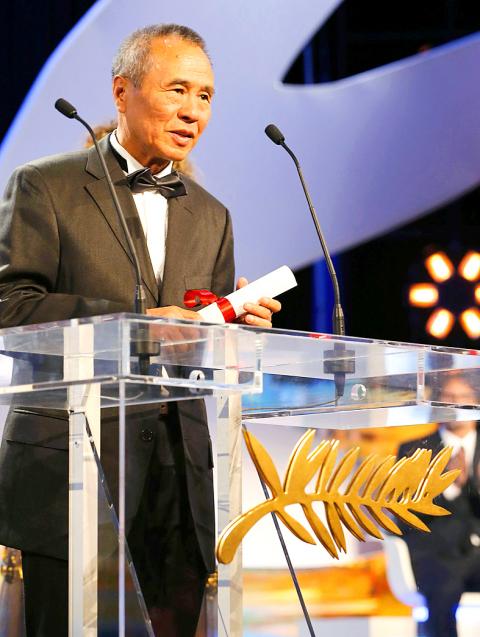Hou Hsiao-hsien (侯孝賢), who won the best director award at the Cannes Film Festival in France on Sunday with his first martial arts film, The Assassin (聶隱娘), said that his next project would be a movie about a river goddess set in the modern era.
Speaking at a seminar in Brussels on Wednesday, Hou said that Taipei used to have many waterways for paddy irrigation, but many of the waterways have since been covered over by roads as a result of urbanization.
If there were a river goddess, she would feel very sad about the situation, Hou said.

Photo: Reuters
Screenwriter Chu Tien-wen (朱天文) said Hou’s new project would be about a waterway enthusiast who encounters a river goddess while studying the city’s waterway system.
Actress Shu Qi (舒淇), the protagonist in The Assassin, would play the role of the river goddess, the 68-year-old director said.
The seminar was part of the “Taiwan Film Panorama” and “Hou Hsiao-hsien Retrospective” held by the Belgian Royal Cinematek.
The exhibition began with a screening of The Assassin on Wednesday, with about 260 people from political, economic, social and arts circles in Belgium and the EU attending.
Speaking to reporters, Hou said he is concerned that there are not many directors who are passionate about their craft, with enough conviction to make movies according to their own standards.
Hou said it is tough to be a director in Taiwan because of the pressure to create a box-office success while seeking a balance between one’s convictions and the views of movie companies and investors.
“These days in Taiwan, you can hardly find a director with the passion and conviction to simply insist that a movie be shot in a particular way or to say: ‘This is how I would like it to be,’” Hou said.
Hou is one of the few Taiwanese directors who are capable of finding funds abroad to support their film ideas.
Still, he has always tried to shoot artistic movies with minimal budgets, he said.
“I know a lot of movie directors would love to shoot grand movies with a big cast and big stars. I don’t find it necessary,” Hou said.
He said he prefers to use digital cameras and fresh faces as his key actors, which can be done on a smaller budget without the restraints imposed by investors.
To make emotional films, “the most fundamental thing is to have a strong impulse to do so,” Hou said. “You also need to have a special feeling about the environment in which you grew up.”
On the criticism that The Assassin is not an easy movie to understand because of the complexity of the main character, Hou said: “If you can understand it, just enjoy it; if you can’t, why not just appreciate it [as a work of art].”
“There are infinite types of films,” he said. “Just watch them in your own way. It’s OK to fall asleep in front of the big screen if you’re there just out of curiosity about the movie.”

ANOTHER EMERGES: The CWA yesterday said this year’s fourth storm of the typhoon season had formed in the South China Sea, but was not expected to affect Taiwan Tropical Storm Gaemi has intensified slightly as it heads toward Taiwan, where it is expected to affect the country in the coming days, the Central Weather Administration (CWA) said yesterday. As of 8am yesterday, the 120km-radius storm was 800km southeast of Oluanpi (鵝鑾鼻), Taiwan’s southernmost tip, moving at 9kph northwest, the agency said. A sea warning for Gaemi could be issued tonight at the earliest, it said, adding that the storm is projected to be closest to Taiwan on Wednesday or Thursday. Gaemi’s potential effect on Taiwan remains unclear, as that would depend on its direction, radius and intensity, forecasters said. Former Weather Forecast

As COVID-19 cases in Japan have been increasing for 10 consecutive weeks, people should get vaccinated before visiting the nation, the Centers for Disease Control (CDC) said. The centers reported 773 hospitalizations and 124 deaths related to COVID-19 in Taiwan last week. CDC Epidemic Intelligence Center Director Guo Hung-wei (郭宏偉) on Tuesday said the number of weekly COVID-19 cases reported in Japan has been increasing since mid-May and surpassed 55,000 cases from July 8 to July 14. The average number of COVID-19 patients at Japan’s healthcare facilities that week was also 1.39 times that of the week before and KP.3 is the dominant

The Chinese Communist Party’s (CCP) working group for Taiwan-related policies is likely to be upgraded to a committee-level body, a report commissioned by the Mainland Affairs Council (MAC) said. As Chinese President Xi Jinping (習近平) is increasingly likely to upgrade the CCP’s Central Leading Group for Taiwan Affairs, Taiwanese authorities should prepare by researching Xi and the CCP, the report said. At the third plenary session of the 20th Central Committee of the CCP, which ended on Thursday last week, the party set a target of 2029 for the completion of some tasks, meaning that Xi is likely preparing to

US-CHINA TRADE DISPUTE: Despite Beijing’s offer of preferential treatment, the lure of China has dimmed as Taiwanese and international investors move out Japan and the US have become the favored destinations for Taiwanese graduates as China’s attraction has waned over the years, the Ministry of Labor said. According to the ministry’s latest income and employment advisory published this month, 3,215 Taiwanese university graduates from the class of 2020 went to Japan, surpassing for the first time the 2,881 graduates who went to China. A total of 2,300 graduates from the class of 2021 went to the US, compared with the 2,262 who went to China, the document showed. The trend continued for the class of 2023, of whom 1,460 went to Japan, 1,334 went to